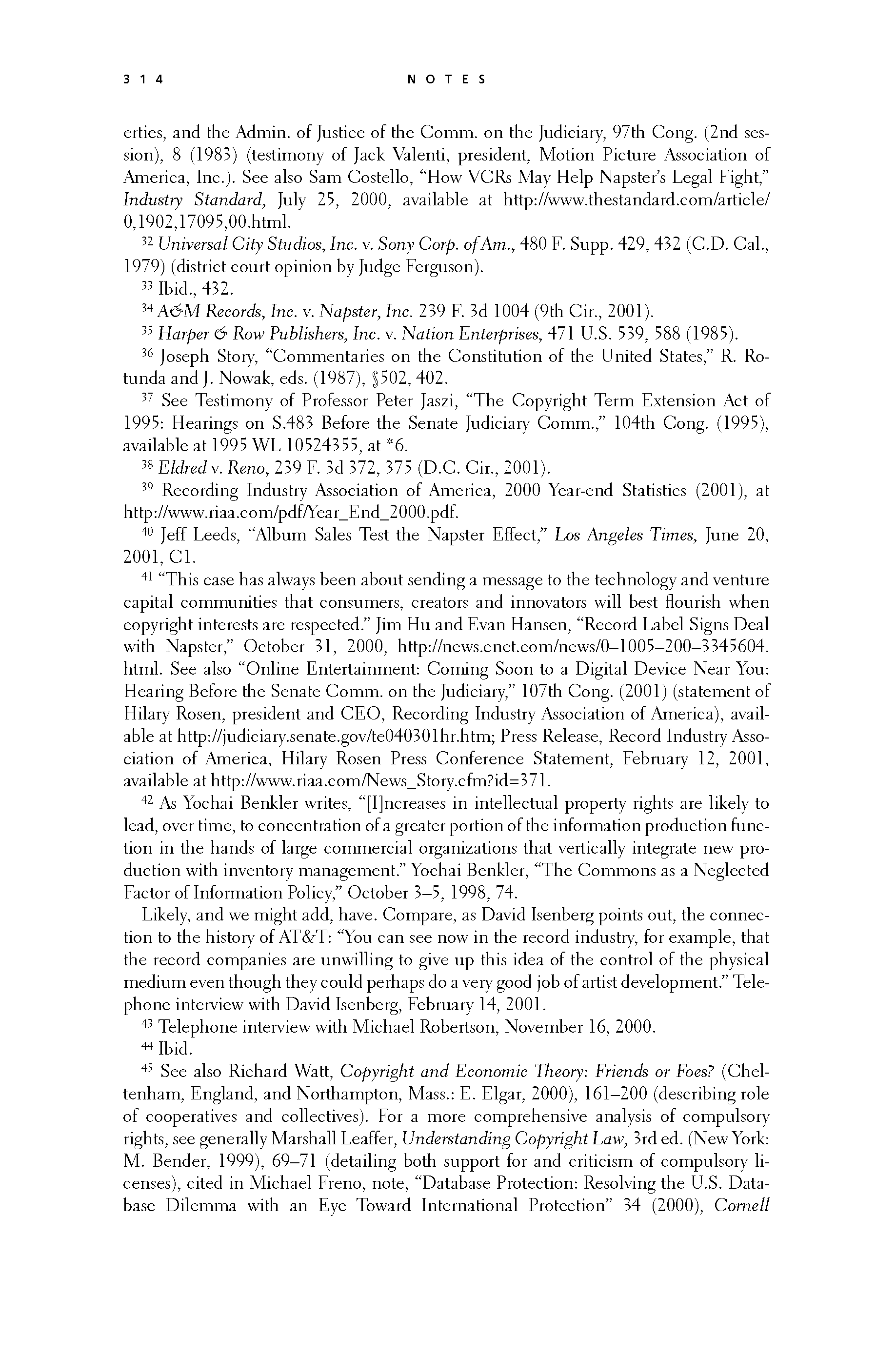 p313 _
-chap- _
toc-1 _
p314w _
toc-2 _
+chap+ _
p315
p313 _
-chap- _
toc-1 _
p314w _
toc-2 _
+chap+ _
p315
erties, and the Admin. of Justice of the Comm. on the Judiciary, 97th Cong. (2nd ses-
sion), 8 (1983) (testimony of Jack Valenti, president, Motion Picture Association of
America, Inc.). See also Sam Costello, "How VCRs May Help Napster's Legal Fight,"
_Industry_Standard,_ July 25, 2000, available at http://www.thestandard.com/article/
0,1902,17095,00.html.
[11-32] _Universal_City_Studios,_Inc._ v. _Sony_Corp._of_Am.,_ 480 F. Supp. 429, 432 (C.D. Cal.,
1979) (district court opinion by Judge Ferguson).
[11-33] Ibid., 432.
[11-34] _A&M_Records,_Inc._ v. _Napster,_Inc._ 239 F. 3d 1004 (9th Cir., 2001).
[11-35] _Harper_&_Row_Publishers,_Inc._ v. _Nation_Enterprises,_ 471 U.S. 539, 588 (1985).
[11-36] Joseph Story, "Commentaries on the Constitution of the United States," R. Ro-
tunda and J. Nowak, eds. (1987), #502, 402.
[11-37] See Testimony of Professor Peter Jaszi, "The Copyright Term Extension Act of
1995: Hearings on S.483 Before the Senate Judiciary Comm.," 104th Cong. (1995),
available at 1995 WL 10524355, at *6.
[11-38] _Eldred_ v. _Reno,_ 239 F. 3d 372, 375 (D.C. Cir., 2001).
[11-39] Recording Industry Association of America, 2000 Year-end Statistics (2001), at
http://www.riaa.com/pdf/Year_End_2000.pdf.
[11-40] Jeff Leeds, "Album Sales Test the Napster Effect," _Los_Angeles_Times,_ June 20,
2001, C1.
[11-41] "This case has always been about sending a message to the technology and venture
capital communities that consumers, creators and innovators will best flourish when
copyright interests are respected." Jim Hu and Evan Hansen, "Record Label Signs Deal
with Napster," October 31, 2000, http://news.cnet.com/news/0-1005-200-3345604.
html. See also "Online Entertainment: Coming Soon to a Digital Device Near You:
Hearing Before the Senate Comm. on the Judiciary," 107th Cong. (2001) (statement of
Hilary Rosen, president and CEO, Recording Industry Association of America), avail-
able at http://judiciary.senate.gov/te040301hr.htm; Press Release, Record Industry Asso-
ciation of America, Hilary Rosen Press Conference Statement, February 12, 2001,
available at http://www.riaa.com/News_Story.cfm?id=371.
[11-42] As Yochai Benkler writes, "[I]ncreases in intellectual property rights are likely to
lead, over time, to concentration of a greater portion of the information production func-
tion in the hands of large commercial organizations that vertically integrate new pro-
duction with inventory management." Yochai Benkler, "The Commons as a Neglected
Factor of Information Policy," October 3-5, 1998, 74.
Likely, and we might add, have. Compare, as David Isenberg points out, the connec-
tion to the history of AT&T: "You can see now in the record industry, for example, that
the record companies are unwilling to give up this idea of the control of the physical
medium even though they could perhaps do a very good job of artist development." Tele-
phone interview with David Isenberg, February 14, 2001.
[11-43] Telephone interview with Michael Robertson, November 16, 2000.
[11-44] Ibid.
[11-45] See also Richard Watt, _Copyright_and_Economic_Theory:_Friends_or_Foes?_ (Chel-
tenham, England, and Northampton, Mass.: E. Elgar, 2000), 161-200 (describing role
of cooperatives and collectives). For a more comprehensive analysis of compulsory
rights, see generally Marshall Leaffer, _Understanding_Copyright_Law,_ 3rd ed. (New York:
M. Bender, 1999), 69-71 (detailing both support for and criticism of compulsory li-
censes), cited in Michael Freno, note, "Database Protection: Resolving the U.S. Data-
base Dilemma with an Eye Toward International Protection" 34 (2000), _Cornell_
[[314]]
p313 _
-chap- _
toc-1 _
p314w _
toc-2 _
+chap+ _
p315